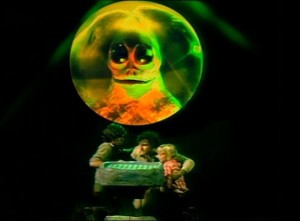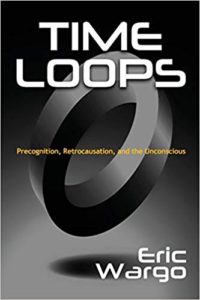Lost in Translation (or, Don’t Look for a Matrix of Meaning)
I have been arguing that present experience contains associative traces of emotional events ahead of us in time; we are detecting (faintly) the future—the real future, not just some imaginatively forecast future—at all moments, mostly beneath the level of conscious awareness. But because the retrocausality implied in this model is so “hard to think” (and culturally taboo), we prefer to interpret our future-sniffing faculty in all kinds of other, classically causal ways. We reframe precognitive visions as telepathy or clairvoyance or spirit mediumship or “past lives“; we reframe precognitive psychosomatic symptoms as manifestations of an off-stage unconscious; and we reframe the surprising, seemingly coincidental outcomes of our precognitive orientation as “synchronicities” stage-managed by a meaningful universe or higher intelligence.
My dream is that the psi ranger of tomorrow will learn to detect and recognize the bent twigs of her own passage ahead of herself in time and understand them for what they are.
Even many parapsychologists dislike the idea of precognition. This results in a funny effect of reserving precognition only for phenomena that absolutely cannot be accounted for through one of the other classical psi channels. My favorite psi guide, psychoanalyst Jule Eisenbud, fell prey to this reasoning: Although he brilliantly analyzed numerous instances of unmistakable “paranormal foreknowledge” displayed by his patients (and himself), he always assumed that if a patient dreamed merely about the contents of the next morning’s paper, for instance, it had to be a case of clairvoyance and not precognition as long as the paper had already been printed at the time of the dream.
I call this the “impossible by degrees” fallacy: If something is hard to think, we assume that nature likewise must find it strenuous to achieve. But if we grant the existence of precognition at all, there is no reason not to think that it is an ubiquitous operating principle in our lives. The problem is we have never had a theory that made it believable or palatable to mainstream scientific thinking.
Nonlocality, commonly invoked in parapsychology since the 1980s, sounds like it ought to fit the bill, but it cannot. All things in space and time may indeed be connected, but that fact doesn’t explain how the psi eyes of a remote viewer like Joe McMoneagle can home in on a Russian Typhoon submarine under construction, amid all possible pieces of information in the universe; he doesn’t know what he is looking for or even where (or when) the coded target is located—and thus has no basis from which to recognize the “right answer.” And quantum entanglement, the basis of nonlocality, cannot explain why a mother might have a vision of her own son dying on a battlefield; the particles that ever linked the two individuals would, as far as we know, have long since broken their special bonds due to the quantum promiscuity called decoherence.
 Although some psychics and psychical researchers have been tempted to see the mind as limitless or omniscient, or as somehow extensions of a higher (or deeper) collective (un)consciousness, I think this kind of explanation is a bit of a cop-out. It removes psi from the scientific pale, and it doesn’t really fit the data very well. Much evidence suggests ESP trades in intimate, idiosyncratic meanings that resonate across an individual’s unique timeline, not on something shared or exchanged across space and among people. “Extraordinary knowing” (to use Elizabeth Mayer‘s term) often can be shown to consist of knowledge that a psychic lacks direct access to currently but will acquire at some point thereafter, often imminently. Other paranormal phenomena like meaningful coincidences have a similarly personal, intimate character, and this should be the needed clue that these phenomena are fundamentally precognitive and likely linked to our own brain processes. It simplifies things considerably to think of them as phenomena related to memory. In fact, McMoneagle himself (in his book Mind Trek) came to exactly the conclusion I have been arguing: that somehow the psychic is sending him/herself information from a future point when the correct answer is learned. (Not surprisingly, the star remote viewer also reports a lifetime of extraordinary memory abilities.)
Although some psychics and psychical researchers have been tempted to see the mind as limitless or omniscient, or as somehow extensions of a higher (or deeper) collective (un)consciousness, I think this kind of explanation is a bit of a cop-out. It removes psi from the scientific pale, and it doesn’t really fit the data very well. Much evidence suggests ESP trades in intimate, idiosyncratic meanings that resonate across an individual’s unique timeline, not on something shared or exchanged across space and among people. “Extraordinary knowing” (to use Elizabeth Mayer‘s term) often can be shown to consist of knowledge that a psychic lacks direct access to currently but will acquire at some point thereafter, often imminently. Other paranormal phenomena like meaningful coincidences have a similarly personal, intimate character, and this should be the needed clue that these phenomena are fundamentally precognitive and likely linked to our own brain processes. It simplifies things considerably to think of them as phenomena related to memory. In fact, McMoneagle himself (in his book Mind Trek) came to exactly the conclusion I have been arguing: that somehow the psychic is sending him/herself information from a future point when the correct answer is learned. (Not surprisingly, the star remote viewer also reports a lifetime of extraordinary memory abilities.)
Thus despite my strong affinity with some aspects of New Age thinking, the scientist side of me is increasingly “anti” one of the strongest currents in that metaphysics, the idea of a transpersonal matrix of meaning connecting humans to each other and to objects, some oceanic amnion of significance in which we are all swimming, or a universal “field” of consciousness whose ripples somehow carry meaningful information across both time and space. This turns out to be a very hot-button issue, as shown in the reactions I sometimes get to these posts and in the forum discussion following my recent Skeptiko appearance. Many psi believers very much want to believe that we are ensconced in an intrinsically meaningful universe and that it is not simply, as I argue, our own meaning-making brains creating the meaning we seem to find in the world ready-made, such as in synchronicities.
In the Out Door
The matrix of meaning goes back, in the Western philosophical tradition, to Plato, who saw the real world imperfectly reflecting the perfect world of ideal forms. This basic idea is reflected in astrology and the hermetic tradition (“as above, so below”) and in the late Medieval theory of similitudes described by Michel Foucault in The Order of Things—a system of correspondences that maps nearly identically onto the tropes used by the dreaming brain in building our associative memory search system. That right there should be a big hint that when we think we see evidence of a meaningful universe, we are encountering our own cortical processes in reflection, a confusion of the subjective and objective.
As an inherently material phenomenon, meaning is really a false friend of any idealist wishing to unseat the dominant materialist paradigm.
The Platonic matrix of meaning has tempted an increasing number of modern theorists of consciousness, psi, and related anomalies. Ervin Laszlo’s “Akashic fields” idea and Rupert Sheldrake’s theory of “morphic fields” owe a great deal to Platonic (meta)physics. And many parapsychologists too adopt an implicitly or explicitly Platonic, matrix-of-meaning model, assuming that such a model is somehow the only possible explanation for psi. For example, in an essay in this past December’s EdgeScience, James Carpenter argues that psi implies
a universe of meaning that exists ‘out’ as well as ‘in.’ As Plato thought, meanings exist beyond the person and are not simply constructed by the person or by groups of people. In psi, we engage meanings that supersede any physical connection to the self. Yet we engage them, we are affected by them, we express implicit references to them. It seems that we find them much more than we make them, and we find them far beyond the normal bounds of the body and the current moment.
I love Carpenter’s “first sight” theory of psi, and agree with his basic argument that psi is not some extraordinary add-on to normal perception but reflects a fundamental substrate of sensation and awareness, basic to our survival. But as an anthropologist, I must challenge him on the idea of meanings existing beyond the person other than in materially instantiated symbols. Meaning is a semiotic phenomenon that is encoded culturally but is made by individual minds/brains; although codes can be transmitted in material form, meaning as such could not exist “outside the head” … and psi does not necessarily imply such an outside-the-head structure of meaning, even if it seems to at first glance.
All data from ethnography, psychology, human development, etc., point to meaning as particular and physically embodied, not transpersonal or reflective of an underlying unus mundus, as Jung phrased it (however appealing we may find such a notion). Cultural systems of meaning are particular to cultures and incommensurable across cultures—there is always something lost in translation. The very notion of a transpersonal or universal matrix of meaning runs counter to how meaning works and how it has to work: Just as there is no “language” as such but only specific languages, meaning is only, ultimately, when you zoom in, a plurality of meanings, which are semiotic in nature, resting ultimately on arbitrary (that is, artificial, made-and-not-found) distinctions within a larger symbolic system that has to be culturally transmitted.
 Making meaning requires imposing arbitrary divisions on otherwise smooth reality. Every meaning-bearing signifier reduces to an arbitrary attachment of a consensus value to some “cut” or distinction in a flow of matter or energy—for instance, a certain gesture in opposition to other possible gestures (or to no gesture), a certain sound in opposition to other possible sounds (or to silence), a certain shape in opposition to other possible shapes (or to emptiness), and so on. The ability of the cortex to pair such “distinctive features” (as they are known in linguistics) with associated values and link them to personal experience in memory is what imbues the world with meaning in the semiotic sense of the term. Meaning is information relative to a context and, most importantly, to a recipient who can use that context to decode and make sense of it, give it value.
Making meaning requires imposing arbitrary divisions on otherwise smooth reality. Every meaning-bearing signifier reduces to an arbitrary attachment of a consensus value to some “cut” or distinction in a flow of matter or energy—for instance, a certain gesture in opposition to other possible gestures (or to no gesture), a certain sound in opposition to other possible sounds (or to silence), a certain shape in opposition to other possible shapes (or to emptiness), and so on. The ability of the cortex to pair such “distinctive features” (as they are known in linguistics) with associated values and link them to personal experience in memory is what imbues the world with meaning in the semiotic sense of the term. Meaning is information relative to a context and, most importantly, to a recipient who can use that context to decode and make sense of it, give it value.
As an inherently material phenomenon, meaning is really a false friend of any idealist wishing to unseat the dominant materialist paradigm. It is a human creation, encoded in culture, made and re-made endlessly in the individual mind/brain. It is also necessarily subjective, dependent upon a particular point of view. As such, it cannot really be collective, other than in the sense of roughly (culturally) shared.
When the World Was Jung
The updated modern version of Plato is Jung, who is of course a sacred and nigh untouchable figure in New Age metaphysics. He also persistently creeps into parapsychological theorizing because his concepts seem to offer at least a useful vocabulary for talking about psi phenomena; his concept of the “collective unconscious” is, like the world of forms, a transpersonal matrix of meaning somehow uniting humans to each other and even to the physical environment. People love the idea of a universal field of energy and insight where basic symbolic motifs exist ready-made and shared, like a central library we all draw from. But what does it really help explain? And how could immaterial ideas “reach in” and shape our lives all on their own, for instance in synchronicities? He was unable to answer this—indeed as Arthur Koestler argued in his essential book, The Roots of Coincidence, he essentially resorted to a causal model but simply called it something different.
The idea of archetypes fast-forwarded past the really meaty questions of meanings and how they are fashioned, negotiated, and transformed in ritual and social action.
Hypostatizing “archetypes” was Jung’s biggest mistake, and it is the main reason that Jung, unlike Freud or Lacan, has zero relevance for today’s social sciences. Even at the time Jung wrote, the sublime complexity of cultural meaning systems as studied by anthropologists and linguists, coupled with the sublime ingenuity of the individual unconscious as mapped by Freud, could already easily explain the commonalities of symbolism that Jung detected in his patients’ lives and dreams and regularities across the mythologies of different cultures. The idea of archetypes fast-forwarded past the really meaty questions of meanings and how they are fashioned, negotiated, and transformed in ritual and social action, and how these processes might produce forms that recur from society to society despite no history of contact.
Meaning is ultimately personal; it takes social action to make it collective, and that making-collective must be renewed again and again in ritual. Meaning is something built up within us over the course of life and perpetually renewed in cultural experience; again, there is no universal language giving meaning to human thoughts prior to learning a language and the other meaning systems constitutive of culture. This is why anthropologists have long looked to Freud and the Freudian psychoanalytic tradition for a basic theory of symbolic motivation, or how culturally encoded symbols become meaningful to the person by linking to our instincts, needs, and drives, and how personal/private symbols conversely become public. Nobody in anthropology reads Jung (except maybe for pleasure), because he unfortunately put the cart of meaning before the horse of embodied cognition.
 If many cultural symbolic motifs are similar all over the world, it is because they reflect human existential universals. Sexual reproduction is basic and universal, thus all cultures symbolize and personify various functions central to sex, motherhood, fatherhood, etc.; conflict and war are universal, so cultures tend to have similar martial symbologies; ironic unconscious processes always trip us up, thus all cultures have a “Trickster”; and so on.
If many cultural symbolic motifs are similar all over the world, it is because they reflect human existential universals. Sexual reproduction is basic and universal, thus all cultures symbolize and personify various functions central to sex, motherhood, fatherhood, etc.; conflict and war are universal, so cultures tend to have similar martial symbologies; ironic unconscious processes always trip us up, thus all cultures have a “Trickster”; and so on.
It is nevertheless a human need to deep down believe in a larger guarantor of the arbitrary cultural meanings we were enculturated into. Jacques Lacan called it the “Big Other.” He assured us that the Big Other does not in fact exist, yet it may be a necessary illusion for users of culture to retain their faith in the symbolic currency of language and symbols—sort of the way a central bank declares and supports the value of its bank notes even if there’s nothing actually in the coffers. Jung’s “collective unconscious” is kind of a transcultural version of the Big Other.
“42”
Much confusion arises, I think, from the failure to draw the proper distinction between meaning and information, which is increasingly becoming the dominant conceptual lens through which physical scientists view complex ordered systems at all scales.
The scandalous irony is that causality as such, the object of scientific inquiry prior to our outside of meaning, is thus outside the known and can only be an article of faith.
Information is really a way to quantify causality. For instance in Seth Lloyd‘s definition, any measurable state of a particle (its spin, charge, etc.) is a “bit” of information. The amount of information in a system is the number of bits needed to describe it, and as chaos/entropy increases in the universe, so (thus) does the amount of information—leading to Lloyd’s argument that the universe can be thought of as a big quantum computer, each of whose physical interactions amounts to “computation,” the processing of information. The Information is not intrinsically meaningful, however, and this is where his metaphor fails a little—unless we imagine that God is sitting at his laptop awaiting some output of all this computation, because it was designed to answer some question in his mind. Computers are generally programmed to produce a desired output, not crunch numbers for no reason; meaning is what expresses this sense of purpose, the value somebody gives to information gained in measurement or computation, the value of information for and to someone. Thus information is a concept that conveys the virtual or potential meaning in causality; but information as such—that is, cause—has no intrinsic meaning, and meaning as such cannot be causal, except via our own actions.
 But (I hear you protest) quantum physics insists that measurement—the giving of meaning to information—has a real physical effect through collapsing wavefunctions, etc. Many things could be said here: First, there is no consensus in physics about what measurement means or what the consciousness of the observer doing the measuring might mean. This is going to be debated for a very long time and may prove unanswerable. And anyway the “observer” that physicists are talking about, by virtue of being injected into the experimental context, has ceased being the subjective, philosophical, “I am here, this is me” consciousness centralized in anti-materialist metaphysics; it could mean just the capability to make a choice … but a computer could do that. The question is whether a computer could experience the answer to its own question—and whether that subjective experience matters somehow in measurement. It may be impossible to answer these questions, because it pushes knowledge and knowability to its limit (the Lacanian Real).
But (I hear you protest) quantum physics insists that measurement—the giving of meaning to information—has a real physical effect through collapsing wavefunctions, etc. Many things could be said here: First, there is no consensus in physics about what measurement means or what the consciousness of the observer doing the measuring might mean. This is going to be debated for a very long time and may prove unanswerable. And anyway the “observer” that physicists are talking about, by virtue of being injected into the experimental context, has ceased being the subjective, philosophical, “I am here, this is me” consciousness centralized in anti-materialist metaphysics; it could mean just the capability to make a choice … but a computer could do that. The question is whether a computer could experience the answer to its own question—and whether that subjective experience matters somehow in measurement. It may be impossible to answer these questions, because it pushes knowledge and knowability to its limit (the Lacanian Real).
This is really what Heisenberg showed back at the birth of quantum physics: Measurement, which imparts a human-given meaning to a physical object like a particle, diverts what might otherwise be a “pure cause” into a flow of symbolic meanings usable by the mind-brain but at the cost that it is now useless for doing other work; we cannot know what a particle might have done if we had not measured it. For causality to flow unimpeded, it cannot be interfered with in the process of giving it meaning—that is to say, making it communicable—through measurement. Thus the indeterminacy principle showed not the role of meaning in nature (as some interpret it) but rather the incommensurability of meaning and cause, and thus the limits of human knowing, and the noncollapsible gap between subjective and objective. There is no traversing this gap. The scandalous irony of course is that causality as such, the object of scientific inquiry prior to our outside of meaning, is thus outside the known and can only be an article of faith.
The Sandbox of Confusion
As Robert Plant famously put it, “sometimes words have two meanings.” This is no more true than of the word meaning itself. I’ve discussed meaning is the semiotic sense, significance as signification; it can only be this sense of meaning that the universe could be thought to consist objectively of a matrix of correspondences that could be invoked to account for phenomena like meaningful coincidences or psi. But when anti-materialists decry the “meaningless” universe described and even created by materialist science, they also partly mean meaning in the larger “meaning of life” sense: A higher significance, a sense of connection, and so on, as well as just the sense of life’s potential and richness, its beauty and grandeur. Science (it is argued) wants to evacuate the world of these things, replacing any sense of God or higher purpose with the impersonal, cold interactions of objects and energy (i.e., information).
Good luck colonizing Mars, developing new antibiotics, or feeding the starving masses with a mindset that meaning has to be part of our scientific picture.
This other meaning of meaning is partly a sense of life being worth living because it interests and excites us—that is, it is a synonym for enjoyment. This kind of meaning can in fact be found in and enhanced by scientific inquiry, but it is certainly not (nor should it be) the point of that inquiry; the point of science is to expand our ability to manipulate the world, expand our instrumentality, and that is achieved via reduction and measurement—which entails setting aside personal preferences about the way the world is (which we call “bias”) and, as much as possible, dispassionately subjecting objects to an impersonal system of theory and measurement. Measurement, in turn, necessarily implies materialism as an operating assumption. Thus meaning not only is inherently material, it demands materiality, and thus is no friend of true idealists.
Some in the psi community think it is a futile enterprise to even use science to investigate or theorize psi phenomena, since such efforts have, after a century and a half, yielded little in the way of a theory. Remote viewer Paul Smith argues that the attempt to scientifically theorize psi reflects a kind of “Stockholm Syndrome,” adopting a framing that is inherently hostile and unhelpful to the real point of exercising psi abilities. It’s an understandable position, and there may even be a way in which understanding psi mechanisms inhibits the actual doing (a common ironic principle in life and art that Lacan summarized with his phrase “how the non-duped err”). But I cling (perhaps naively) to my belief that although the scientific framework has historically been hostile to parapsychology, it is not inherently so. Future scientific understanding could be an essential part of exploring and enhancing psi abilities in new ways. We just need to have faith in that future science … and perhaps give the obstructionist skeptics time to die off.
Science, as social construct, isn’t perfect, but as long as we play by its rules (and don’t oversell its ability to address philosophical questions), it is a valuable, necessary tool. None of us, it is safe to say, would even be here, alive (let alone able to debate these ideas) if it wasn’t for the technologies that reductive, materialist science has made possible, starting with the “concrete science” of myth that (per anthropologist Claude Levi-Strauss) gave us tools and agriculture and animal husbandry. The “meaningless” world that science is sometimes accused of creating comes from the way humans use their crude as well as more refined tools to inflict pain and suffering on themselves and each other—that is, rob the world of spirit or enjoyment—but this is not science’s fault, per se, and it’s hardly a new thing. You can’t gaze at a megalithic site or a pyramid and not realize that the ancients had their own profound issues with and around materialism.
 All this is to say, I’m not a fan of making science and spirit play together in the same sandbox. Since meaning is always meaning-to or -for someone, injecting meaning into science, despairing of causal explanations (as Jung did with his theory of synchronicity, for instance), would entail returning science to the pre-Copernican, Medieval world, where our personal wishes/biases (or, the wishes of the priesthood) dictated scientific truth. Good luck colonizing Mars, developing new antibiotics, or feeding the starving masses with a mindset that meaning has to be part of our scientific picture. Though we often confusedly call upon science to weigh in on philosophical or ethical or poetic questions, those exist on a completely different layer of discourse and experience. To think that these conceptually separate layers causally interact, or that the answers to existing scientific anomalies like psi are to be found in blurring the distinction between subjective (meaning) and objective (information), is to create a sandbox of confusion.
All this is to say, I’m not a fan of making science and spirit play together in the same sandbox. Since meaning is always meaning-to or -for someone, injecting meaning into science, despairing of causal explanations (as Jung did with his theory of synchronicity, for instance), would entail returning science to the pre-Copernican, Medieval world, where our personal wishes/biases (or, the wishes of the priesthood) dictated scientific truth. Good luck colonizing Mars, developing new antibiotics, or feeding the starving masses with a mindset that meaning has to be part of our scientific picture. Though we often confusedly call upon science to weigh in on philosophical or ethical or poetic questions, those exist on a completely different layer of discourse and experience. To think that these conceptually separate layers causally interact, or that the answers to existing scientific anomalies like psi are to be found in blurring the distinction between subjective (meaning) and objective (information), is to create a sandbox of confusion.
If the world comes to seem acquainted with our thoughts (as Jung very aptly put it), it is neither because we live suspended in an amnion of cosmic meaning nor because we are simply deluded about the probabilities of coincidence (as psychologists never tire of insisting), but because our brain is somehow predigesting, pre-metabolizing our future in some way we have yet to fully understand. My dream is that the psi ranger of tomorrow will learn to detect and recognize the bent twigs of her own passage ahead of herself in time and understand them for what they are. The first step toward such a future is casting aside the cultural models of time and causality that currently shackle our imaginations—which includes not only the rigid, unidirectional classical causality of the skeptics but also “matrix of meaning” models that inhibit our scientific inquiry into how the human organism inhabits time.
Postscript: The Spirit of Parallax
To argue against a matrix of cosmic or universal meaning is not a spirit-free stance. It accords quite well with Buddhism, in fact, which would say that enlightenment comes not from departing the material world for some world of meaning but from transcending both of these limited frameworks. The great beauty of the cosmos is in its meaninglessness, its transcendence of the symbolic order as well as material instrumentality.
We really need to get over the fear of dualism, a fear shared by both materialist and idealist extremists.
This higher transcendent dimension of awareness and bliss, the rarified sense of “consciousness” that mystics have always united with, and that I think is really synonymous with enjoyment as the Lacanian tradition describes it, surpasses all symbolic cuts and measures and forms. Those who have not united with it but admire it from afar wrongly suppose it to be a place rich in meanings, a “mind” in the everyday sense, as somehow a plenitude of thoughts and ideas and information. But bliss-awareness, at its root, precedes any structuration; there is no information or meanings there.* There is only meaning in that other sense of the word, as fulfillment and reward and a sense of connection.
We really need to get over the fear of dualism, a fear shared by both materialist and idealist extremists. The triumphal voices in both camps somehow think the only pure way to be is to be a monist, and thus they all, on whichever side of the divide, commit the sin of reduction, reducing or assimilating the opposite viewpoint to their own. Hardcore eliminative materialists try to destroy and assimilate meaning to the objective—a stupid, pointless position that only makes them feel better, less threatened by mystery and uncertainty and subjectivity. Hardcore idealists, on the other hand, equally falsely claim the scientific enterprise is bankrupt or a lie because it doesn’t make a place for meaning and spirit. They claim that, since the material world is “within consciousness” (a true-enough statement) then meaning ought to somehow be a causal term in scientific explanations (an unsupported and confused statement, not logically flowing from the first).
The fact is, humans are dual creatures; we need both points of view, subjective and objective, idealist and materialist, spiritual and instrumental, and these opposites do not add up or complement each other or form any harmonious unity. This is the uncomfortable condition of “parallax” described by Slavoj Žižek, identical to the “no self” of the Buddhist tradition. I am thus unashamed to be an anamorphic dualist, flickering between these viewpoints. I highly recommend such a position for stress relief: You no longer get angry at the arrogant reductive materialists or impatient with the fuzzy-headed New Agers (God bless ‘em). Both positions are expressions of monist extremism, fearful of impurity, wanting things to balance and harmonize. Instead, embrace impurity and meaninglessness and non-closure. Embrace parallax. That impossible no-space in-between is where Zen is.
NOTE:
* … Which is why it is important to always question the spiritual value of information-dense visions reported by Gnostic and psychedelic explorers. Gnosticism is an intellectual and critical path, but not a spiritual one. Terrence McKenna the entheogen prophet and Phil Dick the Gnostic prophet were among the smartest people I’ve ever had the joy to read, but neither strike me as anything like enlightened. And while they both reported back about plenitudes of “alien” information (McKenna’s solidified language in DMT-land, Dick’s hypnagogic galley proofs and data-dense milk cartons, etc.), with sparse exceptions they were never quite able to report the content of the information they had seen or glimpsed, just its form—as though it had the fleetingness and insubstantiality of a dream.
What neither could quite discern was that that alien information they saw was their own future writings (and talkings, in McKenna’s case). The invisible landscape of information, the robot satellites beaming Dick information, were just figurations for the information they would themselves produce through their brilliant inspired discourse; it was their own future products they were seeing. The insubstantiality of our precognitive visions reflects the fact that they can only be sketches until we ourselves have done the work of coloring them in.






Your hypothesis seems to me to make a very strong testable prediction: precognition can only extend a short distance into the future, “three score years and ten” or whatever a human lifetime may be.
For example (although I personally am not very impressed with Nostradamus) let us suppose that some writing of his is discovered that unambiguously and unmistakably predicts the course of, say, the Second World War. Clearly, Nostradamus could never have “remembered” the outcome of the Second World War at any point in his life. More specifically, he could not “pre-cognise” any event subsequent to 1566.
So a prophecy of events unfolding after the prophet’s death would show, perhaps not that your hypothesis is false, but at least that some other mechanism is also at work, would it not? And does not the literature of psychic phenomena contain many examples (doubtless controversial, but no more so than most instances of short-range precognition) of just such prophecies?